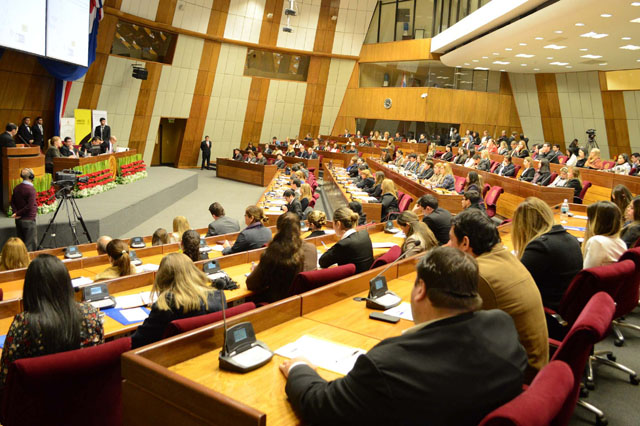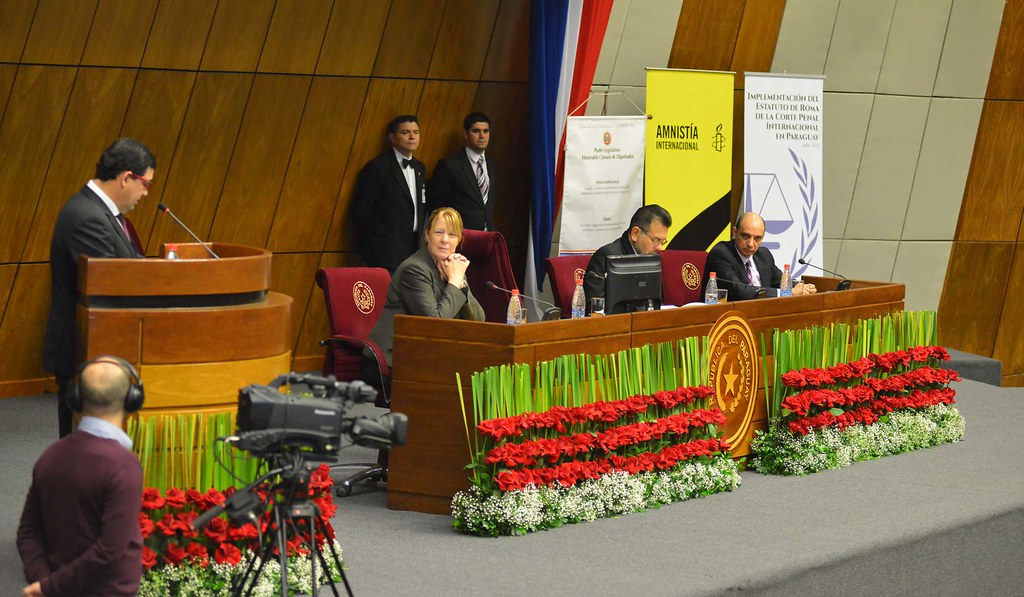
July 7, 2016 | Chamber of Deputies, Asuncion, Paraguay
On 7 July 2016, in the framework of its Parliamentary Campaign for the Effectiveness and Universality of the Rome Statute, Parliamentarians for Global Action (PGA) organized Consultations on the Implementation of the Rome Statute and Support to the Court, hosted by the House of Deputies of Paraguay with the in-kind support of the Coalition for the International Criminal Court (CICC) and Amnesty International (AI).
This event aimed at boosting the Rome Statute implementation process that have started in 2013 in the parliament when the government sent the bill of implementation to the Senate. The Consultations also provided a platform for an enriching debate on the ratification and implementation of the Kampala Amendments to the Rome Statute on the crime of aggression and war crimes.
The Consultations benefitted from the active participation of a large number of Paraguayan Legislators and their parliamentary staff from the relevant committees – including the Committee of Foreign Affairs, Justice, Constitutional Affairs and Security – government representatives, members of the diplomatic community, representatives of local and international civil society, regional parliamentarians, and experts in the field.
As a direct and immediate result of the Consultations, Sen. Emilia Patricia Alfaro - recognizing the importance of the implementing legislation of the Rome Statute in Paraguay- took the floor to announce that she would present a motion of preference to the plenary of the Senate, the same day of the consultations, for the urgent treatment of the implementing legislation. The motion was accepted by unanimity and the bill is scheduled to be considered during the Senate plenary session of August 2016.
In the opening remarks, Dip. Hugo Velázquez Moreno, President of the Chamber of Deputies of Paraguay, Dr. Raúl Caballero, Deputy Ministry of Justice and Min. Juan Miguel González Bibolini, Director of the Human Rights Department of the Ministry of Foreign Affairs of Paraguay welcomed the consultations and committed to continue supporting the implementation process of the Rome Statute.
The discussions were vibrant and enriching, inter alia thanks to the contributions of Judge Silvia Fernandez de Gurmendi, President of the International Criminal Court (ICC), who reminded the audience via a video message that the ICC is a fundamental tool for the International Community that contributes to the prevention and prosecution of international crimes, namely genocide, crimes against humanity and war crimes. Similarly as the ICC, national jurisdictions have the primary responsibility to prosecute such crimes and, under the principle of individual criminal responsibility, bring the perpetrators to justice. The ICC is thus, a Court of ‘last resort’ that complements national jurisdictions, intervening in case States are unable or unwilling to prosecute the perpetrators of international crimes. Legislators have a fundamental role in strengthening the Rule of Law in their countries through the full implementation of the Rome Statute of the ICC. President Fernandez also reminded the participants of the decisive role played by States when cooperation is needed by the ICC to fulfill its mandate.
Another fundamental aspect of the Rome Statute system, reparations for victims of international crimes, was presented by Dr. Felipe Michelini, Board member of the ICC Trust Fund for Victims (TFV) and former PGA Board member. In his presentation, Dr. Michelini highlighted the important role of the TFV in supporting and implementing programs that address the injuries resulting from the Rome Statute core crimes, inter alia by providing physical, psychological, and material support to victims and their families.
To highlight the fundamental role played by States under the principle of complementarity of the Rome Statute, Ab. Hugo Relva (AI) addressed key elements of the Rome Statute, focusing on the core crimes, i.e. crimes against humanity, war crimes, genocide and crime of aggression, as well as the principles of law included in such international treaty. Mr. Relva provided best practices as well as common errors in the full implementation of the Rome Statute. In a comparative analysis, Ab. Relva presented examples of penal codes or implementing legislations of different countries in the region (Argentina, Ecuador, Panama and Uruguay) that reflect, or fail to do so, the rules and international standards included in the Rome Statute.
In a similar comparative line, Dip. Margarita Stolbizer (Argentina) shared the experience of her country regarding the implementation of the Rome Statute highlighting the importance of the process for countries such as her own and Paraguay that have suffered the results of dictatorial regimes. Dip. Stolbizer also commented on the challenges they are facing on the ratification of the Kampala Amendments and announced the good signals that the PGA national group has received from the government when answering to their request to receive in the parliament the bill for ratification/acceptance of the Kampala Amendments.
The ICC not only contributes to the punishment of perpetrators of the most serious crimes of international concern, but also has a deterrence effect, as Dip. Bogado Tatter (Paraguay) rightly mentioned in his presentation. Additionally, Dip. Bogado emphasized the importance of the principle of complementarity and described the process of implementation in Paraguay – highlighting this legislation to represent the commitment of Paraguay to the never repeat its recent history of gross human rights violations.
The important role played by States in the fulfillment of ICC´s mandate thought effective cooperation was stressed by PGA’s Legal Advisor. Ab. Romina Morello detailed the cooperation obligations for states as well as the dangers of non-cooperation for the efficient functioning of the ICC as an international court which has not have a police force or a territory. As a way to advance the process of implementation Ab. Morello highlighted the very positive elements of the implementing legislation under consideration in the Senate as well as provided some recommendations on how to make the national mechanisms of cooperation with the ICC more effective based on the PGA reference law on cooperation.
On the same topic, Dip. Fernando Nicora (Paraguay) highlighted the importance of cooperation for the functioning of the ICC as well as encouraged the approval of the implementing legislation in the Senate since the aforementioned bill includes an entire chapter dedicated to the cooperation with the ICC.
The consultations provided a unique framework to discuss the ratification of the Kampala Amendments to the Rome Statute. In this context, Ab. Michelle Reyes (CICC) introduced the topic explaining the definition of the crime of aggression as well as the jurisdiction of the ICC over this crime and mentioned the weapons forbidden in non-international armed conflict. Getting into the political side of the ratification process, Dip. Daniel Radío (Uruguay) shared with his colleagues from Paraguay the challenges of the process in his country, the first Latin American country to ratify both amendments, and encouraged Paraguay to join his country in the criminalization of the responsible leaders for the illegal use of force.
The discussion finalized with the closing remarks of Dip. Barrios Monges (Paraguay) who thanked the panelists and participants. On behalf of Parliament, he committed to boost the process of implementation of the Rome Statute and the ratification of the Kampala Amendments, while highlighting the need, as representatives of Paraguay, to use the political and legislative power and prerogatives available to them in order to promote international cooperation and the promotion of universal human rights.
In collaboration with Amnesty International Paraguay and the Coalition for the ICC (CICC), PGA organized special sessions on the ICC at the Supreme Court of Paraguay where more than 30 judges and prosecutors participated. In this session special emphasis was put in the legal analysis of the definitions of the crimes and principles included in the Rome Statute as well as the best practices of cooperation with the ICC. On this regard, judges and prosecutors actively engaged in the debate on how to improve the participation of the judiciary in the national mechanisms to ensure full and effective cooperation with the ICC.
A separate event was also held at Columbia University, where more than 150 students, professors and lawyers interacted with the panelists on issues and concerns regarding the Rome Statute system and the functioning of the ICC.

